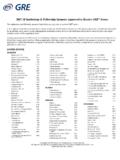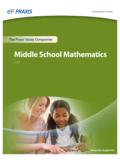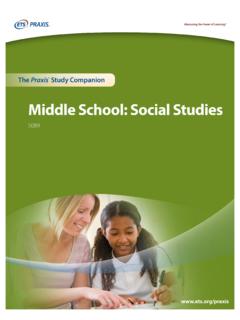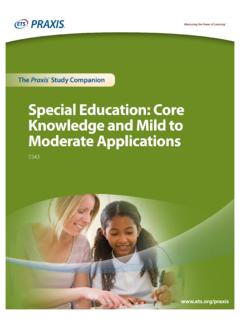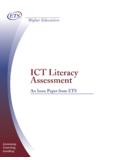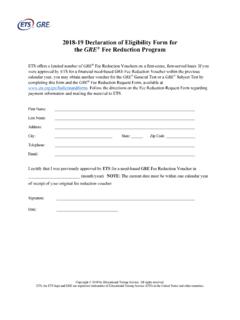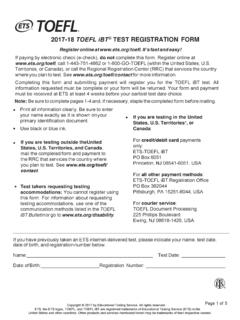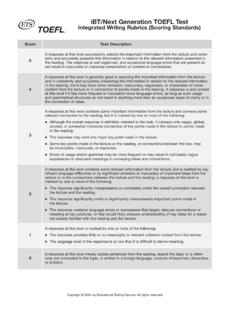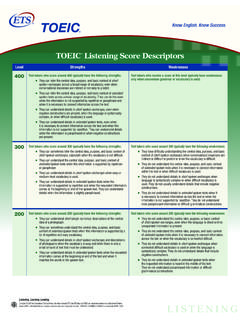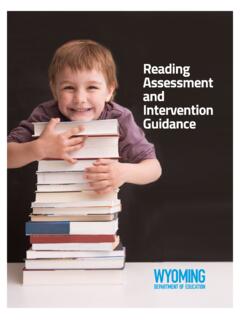Transcription of Reading for Virginia Educators: Elementary and Special ...
1 Reading for Virginia Educators: Elementary and Special Education Praxis Study Companion2 The Praxis Study CompanionWelcome to the Praxis Study CompanionWelcome to the Praxis Study Companion Prepare to Show What You KnowYou have been working to acquire the knowledge and skills you need for your teaching career. Now you are ready to demonstrate your abilities by taking a Praxis test. Using The Praxis Series Study Companion is a smart way to prepare for the test so you can do your best on test day. This guide can help keep you on track and make the most efficient use of your study Study Companion contains practical information and helpful tools, including: An overview of the Praxis tests Specific information on the Praxis test you are taking A template study plan Study topics Practice questions and explanations of correct answers Test-taking tips and strategies Frequently asked questions Links to more detailed informationSo where should you start?
2 Begin by reviewing this guide in its entirety and note those sections that you need to revisit. Then you can create your own personalized study plan and schedule based on your individual needs and how much time you have before test in mind that study habits are individual. There are many different ways to successfully prepare for your test. Some people study better on their own, while others prefer a group dynamic. You may have more energy early in the day, but another test taker may concentrate better in the evening. So use this guide to develop the approach that works best for teaching career begins with preparation. Good luck!Know What to ExpectWhich tests should I take?
3 Each state or agency that uses the Praxis tests sets its own requirements for which test or tests you must take for the teaching area you wish to you register for a test, confirm your state or agency s testing requirements at are the Praxis tests given?Praxis tests are given on computer. Other formats are available for test takers approved for accommodations (see page 42).3 The Praxis Study CompanionWelcome to the Praxis Study CompanionWhat should I expect when taking the test on computer?When taking the test on computer, you can expect to be asked to provide proper identification at the test center. Once admitted, you will be given the opportunity to learn how the computer interface works (how to answer questions, how to skip questions, how to go back to questions you skipped, etc.)
4 Before the testing time begins. Watch the What to Expect on Test Day video to see what the experience is and when are the Praxis tests offered?You can select the test center that is most convenient for you. The Praxis tests are administered through an international network of test centers, which includes Prometric Testing Centers, some universities, and other locations throughout the schedules may differ, so see the Praxis Web site for more detailed test registration information at The Praxis Study Companion4 Table of ContentsTable of ContentsThe Praxis Study Companion guides you through the steps to success1. Learn About Your Test ..5 Learn about the specific test you will be taking2.
5 Familiarize Yourself with Test Questions ..10 Become comfortable with the types of questions you ll find on the Praxis tests3. Practice with Sample Test Questions ..14 Answer practice questions and find explanations for correct answers4. Determine Your Strategy for Success ..23 Set clear goals and deadlines so your test preparation is focused and efficient5. Develop Your Study Plan ..26 Develop a personalized study plan and schedule6. Review Study Topics ..30 Detailed study topics with questions for discussion7. Review Smart Tips for Success ..40 Follow test-taking tips developed by experts8. Check on Testing Accommodations ..42 See if you qualify for accommodations that may make it easier to take the Praxis test9.
6 Do Your Best on Test Day ..43 Get ready for test day so you will be calm and confident10. Understand Your Scores ..45 Understand how tests are scored and how to interpret your test scoresAppendix: Other Questions You May Have ..47 The Praxis Study Companion5 Step 1: Learn About Your Test1. Learn About Your TestLearn about the specific test you will be takingReading for Virginia Educators: Elementary and Special Education (5306)Test at a GlanceTest Name Reading for Virginia Educators: Elementary and Special EducationTest Code 5306 Time hoursNumber of Questions 100 selected-response questions (Part A), 3 constructed-response questions (Part B)Format Selected-response questions and constructed-response questionsTest Delivery Computer delivered Approximate Approximate Content Categories Number of Percentage of Questions Examination Part A.
7 Selected-response questions 100 80% I. Assessment and Diagnostic Teaching 19 15% II. Oral Language and Oral Communication 19 15% III. Reading Development 43 35% IV. Writing and Research 19 15% Part B: Constructed-response questions 3 20% V. Analysis and Application A. Analysis of Assessment and Diagnostic 1 6 % Teaching B. Application of Reading Development 1 6 % Knowledge C. Analysis and Application of Writing 1 6 % and ResearchPacing and In allocating time on this assessment, it is expected that approximately 105 Special Tips minutes will be spent on Part A (the selected-response section) and approximately 45 minutes on Part B (about 15 minutes on each constructed-response section).
8 Please note that Parts A and B are not independently Praxis Study Companion6 Step 1: Learn About Your TestAbout This TestThe Reading for Virginia Educators: Elementary and Special Education test is intended primarily for entry-level Elementary and Special education teachers who have completed training in a program to prepare them to teach in either of these areas. The purpose of the test is to determine that the entry-level Elementary and Special education teacher will have the knowledge, skills, and abilities that are important, necessary, and needed at time of entry to the profession to teach test may contain some questions that will not count toward your SpecificationsTest specifications in this chapter describe the knowledge and skills measured by the test.
9 Study topics to help you prepare to answer test questions can be found in 6. Review Study Topics on page Assessment and Diagnostic TeachingA. Understand the characteristics and uses of assessment and screening measures for evaluating students language proficiency and Reading skills1. Demonstrate knowledge of formal assessments, informal assessments, and screening measures for evaluating students oral and written language proficiency2. Demonstrate knowledge of formal and informal assessments and screening measures for evaluating emergent readers and beginning readers knowledge and skills, including concepts of print, phonemic awareness , letter recognition, sound-symbol knowledge, single-word recognition, and decoding3.
10 Demonstrate knowledge of formal and informal assessments and screening measures for monitoring the ongoing development of students Reading skills and strategies, including word-attack skills, vocabulary, word recognition in context, Reading fluency, and oral and silent Reading comprehensionB. Understand the use of assessment data to plan Reading instruction1. Recognize how to use assessment data to diagnose the Reading needs of, and tailor instruction for, individual students2. Recognize how to use diagnostic Reading data to differentiate instruction to accelerate the development of students Reading skills3. Recognize how to use diagnostic Reading data to differentiate instruction to address the needs of students with Reading difficulties4.
